

The Burden of Choice. The quest for infinite choice is one of the hallmarks of human experience.
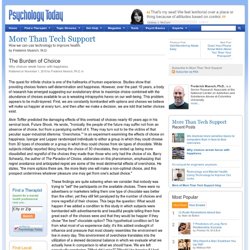
Studies show that providing choices fosters self-determination and happiness. However, over the past 10 years, a body of research has emerged suggesting our evolutionary drive to maximize choice combined with the abundance of choices available to us is wreaking intrapsychic havoc on our well-being. This problem appears to be multi-layered.
First, we are constantly bombarded with options and choices we believe will make us happier at every turn, and then after we make a decision, we are told that better choices exist. Alvin Toffler predicted the damaging effects of this overload of choices nearly 40 years ago in his seminal book, Future Shock. Understanding the Psychology of the American Idea of Choice. Choice is a fundamental American value that often lies at the center of heated political discussions.
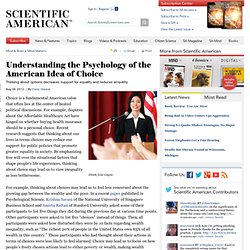
For example, disputes about the Affordable Healthcare Act have hinged on whether buying health insurance should be a personal choice. Recent research suggests that thinking about our lives in terms choices may reduce our support for public policies that promote greater equality in society. By emphasizing free will over the situational factors that shape people’s life experiences, thinking about choice may lead us to view inequality as less bothersome. For example, thinking about choices may lead us to feel less concerned about the growing gap between the wealthy and the poor. In a recent paper published in Psychological Science, Krishna Savani of the National University of Singapore Business School and Aneeta Rattan of Stanford University asked some of their participants to list five things they did during the previous day at various time points. Perfect Match… Or Is It?
In today’s society, arranged marriages are seen as archaic.
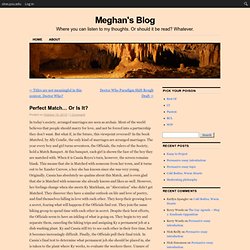
Most of the world believes that people should marry for love, and not be forced into a partnership they don’t want. But what if, in the future, this viewpoint reversed? Does love last longer in arranged marriages? NEW YORK – Elke Thompson and Sam Quinn got engaged the old-fashioned way: their parents arranged it.
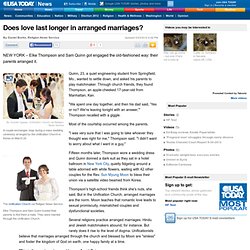
Quinn, 23, a quiet engineering student from Springfield, Mo., wanted to settle down, and asked his parents to play matchmaker. Through church friends, they found Thompson, an apple-cheeked 17-year-old from Manhattan, Kan. "We spent one day together, and then his dad said, 'Yes or no? We're leaving tonight with an answer,'" Thompson recalled with a giggle. A new study finds arranged marriages are happy.
August 22, 2012|By Nara Schoenberg, Tribune Newspapers (Tim Macpherson, Riser photo/Getty Images) In the United States, we think we know about arranged marriages: Your relatives choose your husband or wife, or present you with a limited pool of candidates, thereby diminishing your options and, ultimately, the chances that you will live happily ever after.
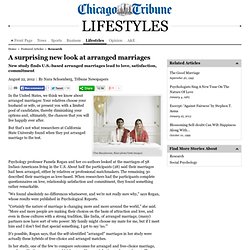
But that's not what researchers at California State University found when they put arranged marriage to the test. Forced marriage parents face jail under new laws. 8 June 2012Last updated at 11:07 GMT The new law is expected to acknowledge the differences between forced marriages where there is no consent and arranged marriages Parents who force their children to marry in England and Wales could be jailed under planned new laws.
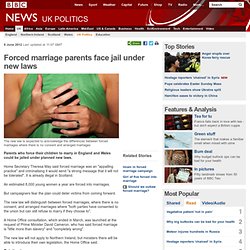
Home Secretary Theresa May said forced marriage was an "appalling practice" and criminalising it would send "a strong message that it will not be tolerated". It is already illegal in Scotland. An estimated 8,000 young women a year are forced into marriages. Population Control and Consequences in China.